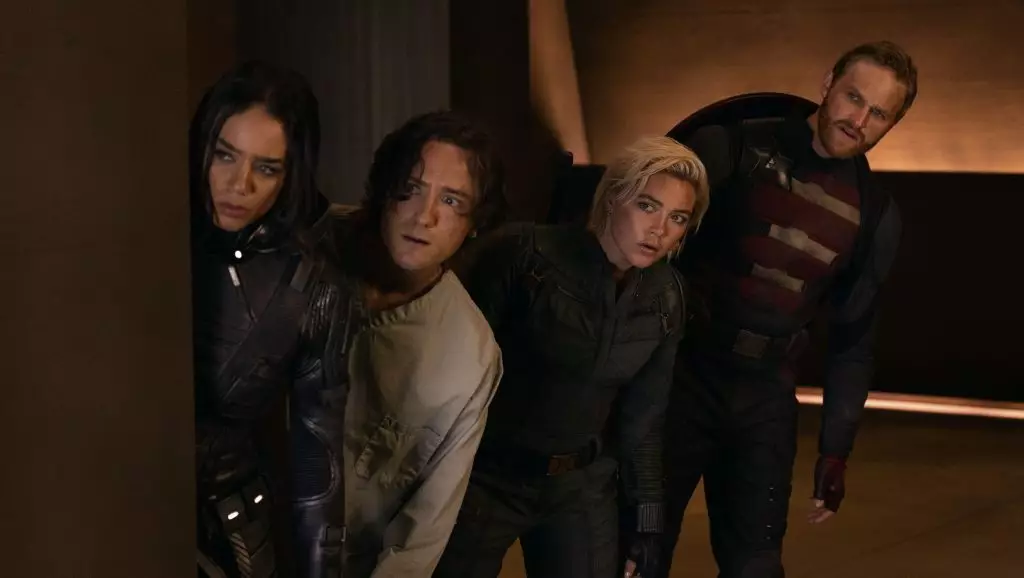As Disney and Marvel Studios celebrate the lukewarm performance of their latest offering, *Thunderbolts*, one can’t help but question the rationale behind their continued investment in blockbuster franchises. This film is anticipated to rake in about $30 million in its second weekend, reflecting a staggering 60% drop from its opening weekend. While some may argue that a $30 million haul sounds respectable, it’s hard to ignore the reality: the franchise seems to be losing its momentum. The spectacle that once attracted throngs of fans is starting to feel like a chore. With a landscape littered with films struggling to reach the million-dollar mark, it’s evident that audiences are growing weary of the formula that dominated the cinematic landscape for over a decade.
Moreover, with the summer movie season inching closer, one has to wonder if this particular genre—superhero action—has overstayed its welcome. As the cinematic universe expands in both ambition and complexity, it risks alienating casual viewers. They might ask themselves: “Do I really need to watch all the previous installments just to grasp the newest character arcs?” The increasing levels of astrophysical nonsense and convoluted storylines run the risk of stifling creativity and draining the goodwill audiences previously had for these comic book adaptations.
Competing for Attention: Sinners and the Genre Shift
On the other hand, Warner Bros.’ recent success with *Sinners*—a vampire-themed blockbuster that has crossed the $200 million mark—is a poignant example of how changing narratives can revive interest in a tired genre. Directed by Ryan Coogler and featuring Michael B. Jordan, the film has proven that audiences are still willing to flock to theaters, but they demand something fresh. Unlike the repetitive formulas seen in superhero movies, *Sinners* presents a unique angle that has reinvigorated a worn-out trope.
This reflects a broader trend: as Hollywood continuously rehashes old franchises, original storytelling has become a premium commodity. Beyond the numbers, what audiences crave is an authentic narrative experience that diverges from cliched superhero tropes, perhaps as a silent protest against the glut of remakes and reboots. We might just be witnessing a critical turning point where genres traditionally considered “safe” are forced to evolve or suffer in ticket sales. The flicker of hope is palpable—audiences are ready for a renaissance in storytelling.
New Releases: A Disappointing Landscape
As this all plays out, new releases, like *Clown in the Cornfield* and *Shadow Force*, reflect the dire need for innovation. The former has garnered an alarming 80% fresh rating from critics, drawing attention for its odd premise rooted in nostalgia and horror, set against the backdrop of a fading Midwestern town. This just goes to show that when the stakes are high, filmmakers can deliver compelling narratives that pull audiences back in.
Conversely, *Shadow Force* appears to be reinforcing the negative aspects of formulaic filmmaking. With a dismal Rotten Tomatoes score of 50%, it further solidifies a troubling reality: studios are increasingly banking on familiar names and star power rather than substance. This pattern not only diminishes the quality of cinema but risks tarnishing the very brands they seek to promote. It begs the question: are audiences ready to demand more or continue settling for mediocrity cloaked in familiar packaging?
The Fragile State of Hollywood’s Future
Moreover, the anticipation surrounding films like *Fight or Flight* raises intriguing issues about what audiences really value. With a solid Rotten Tomatoes score of 78%, this film seems to promise a more intimate character study cloaked in action. The marketing reflects an understanding that while people may flock to the big-budget spectacles, they still crave stories that resonate on a personal level.
In this complex landscape, it’s increasingly clear that Hollywood is teetering on the precipice of transformation 5. Whether that be diving deeper into narratives that reflect authentic human experiences or continuing to churn out franchise films ad nauseam remains to be seen. A crucial shift is inevitable, either through an acknowledgment of audience demand or a catastrophic market correction that rattles studios awake.
With so many factors at play, one thing is certain: the pendulum is swinging, and Hollywood must either adapt or face an even more disheartening reality at the box office. The battle for the soul of cinema is ongoing, and it may just take a surprising underdog to champion the cause.

